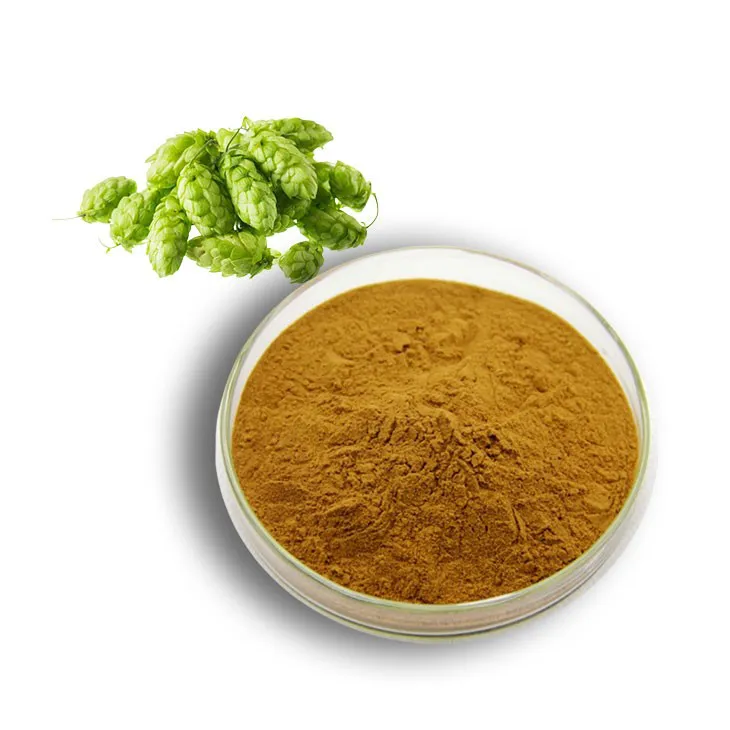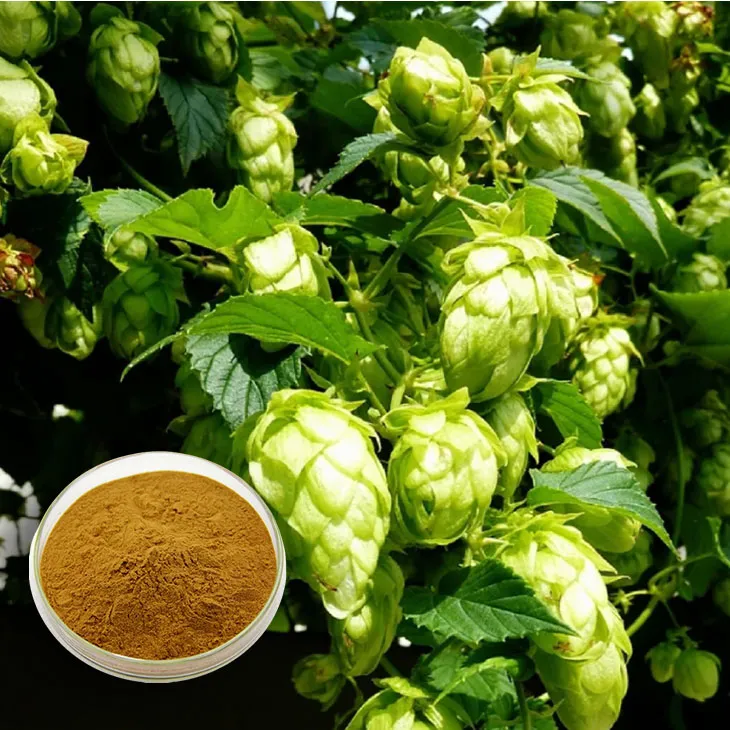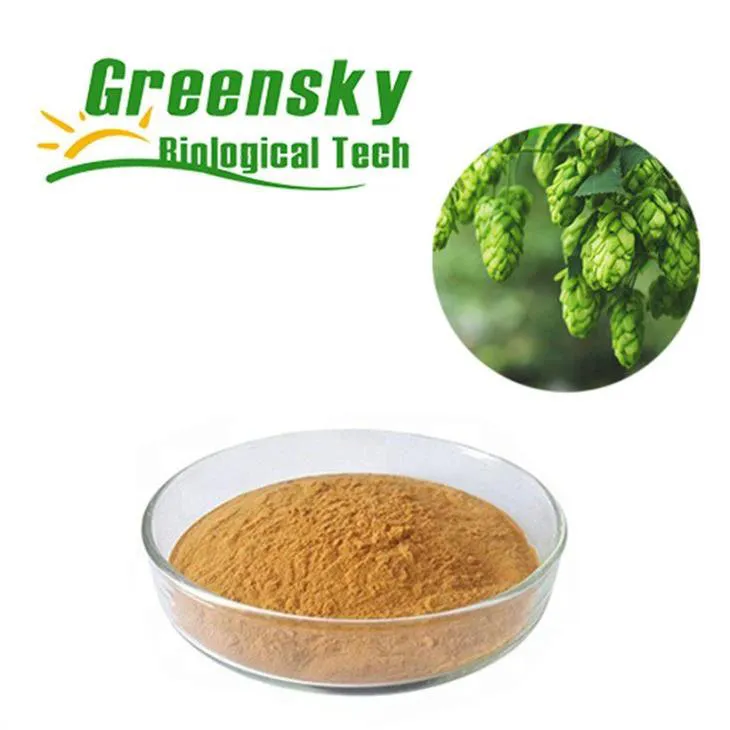- 0086-571-85302990
- sales@greenskybio.com
Extraction process of hops extract.
2024-11-30

1. Introduction to Hops
Hops are an essential ingredient in beer production. They are the female flower clusters of the hop plant, Humulus lupulus. Hops contribute to the unique flavor, aroma, and stability of beer. The extraction of Hops Extract is a crucial step in harnessing these beneficial properties for the brewing industry.

2. Harvesting of Hops
2.1 Timing of Harvest
The proper harvesting time is of utmost importance for hops. Hops are typically harvested when they reach the optimal stage of maturity. This is usually determined by factors such as the appearance of the cones, which should be fully formed and have a characteristic color and texture. Harvesting too early or too late can significantly affect the quality and quantity of the active components in the hops.
2.2 Fresh or Dried ProcessingOnce harvested, hops can be processed either fresh or after drying.
- Fresh hops contain a high amount of moisture and are more perishable. However, they can offer a unique, fresh flavor profile to the beer. Brewing with fresh hops often requires special handling and processing techniques due to their high moisture content.
- Dried hops are more commonly used in large - scale brewing operations. Drying helps to reduce the moisture content, which in turn helps in preservation and easier storage. The drying process also concentrates some of the active components in the hops, such as the alpha and beta acids that are important for beer flavor and stability.

3. Modern Extraction Methods
3.1 The Preference for Environment - Friendly Solvents
In modern extraction processes, there is a growing preference for using environmentally - friendly solvents. This is driven by both environmental concerns and the need to produce high - quality, pure Hops Extract. Traditional solvents may leave behind residues or have a negative impact on the environment during production and disposal.
3.2 Supercritical Carbon Dioxide ExtractionOne of the most popular methods for extracting Hops Extract today is supercritical carbon dioxide (SC - CO₂) extraction.
-
3.2.1 Principle of SC - CO₂ Extraction
Carbon dioxide is a non - toxic, non - flammable gas that can be easily obtained. Under specific pressure and temperature conditions, carbon dioxide reaches a supercritical state. In this supercritical state, it has properties similar to both a gas and a liquid. It can effectively dissolve the active components in the hops, such as the resins (containing alpha and beta acids) and essential oils that are responsible for the flavor and aroma of beer.
-
3.2.2 Pressure and Temperature Conditions
The pressure and temperature for supercritical carbon dioxide extraction are carefully controlled. Generally, the pressure is maintained in the range of approximately 7 - 50 MPa (mega - pascals), and the temperature is typically around 31 - 40 °C. These specific conditions are crucial for achieving the optimal solubility of the hops components in the supercritical carbon dioxide.
-
3.2.3 The Extraction Process
- First, the hops are loaded into the extraction vessel. The vessel is then sealed to ensure a closed - loop system.
- Next, supercritical carbon dioxide is introduced into the extraction vessel at the appropriate pressure and temperature. As it circulates through the hops, it dissolves the desired components.
- The carbon dioxide - hops extract mixture is then transferred to a separation vessel. Here, by carefully adjusting the pressure and temperature, the carbon dioxide reverts to a gaseous state, leaving behind the concentrated hops extract.

4. Separation and Refinement
4.1 Separation from the Solvent System
After the extraction using supercritical carbon dioxide, the next step is to separate the hops extract from the solvent system. As mentioned earlier, this is achieved by changing the pressure and temperature conditions in the separation vessel. The carbon dioxide, which is now in a gaseous state, can be recycled and reused in the extraction process, making the method more cost - effective and environmentally friendly.
4.2 Refinement StepsThe initial extract obtained may still contain some impurities or unwanted components. Therefore, further refinement steps are necessary.
- One common refinement method is filtration. Filtration can remove solid particles, such as pieces of plant material or other insoluble substances that may be present in the extract. Different types of filters, such as membrane filters or depth filters, can be used depending on the nature and size of the impurities to be removed.
- Another refinement step may involve chromatography. Chromatography techniques can be used to separate and purify the different components of the hops extract. For example, high - performance liquid chromatography (HPLC) can be used to separate and analyze the individual components in the extract, ensuring that the final product has a consistent and high - quality composition.
5. Importance of Hops Extract in Beer Production
5.1 Flavoring
The hops extract plays a crucial role in flavoring beer. The essential oils present in the extract contribute to the characteristic aroma of beer, which can range from floral and fruity to spicy and earthy. The alpha and beta acids in the extract also play a role in the bitterness of the beer. Different varieties of hops have different flavor profiles, and brewers can carefully select and blend hops extracts to create a wide variety of beer flavors.
5.2 Stability and PreservationIn addition to flavoring, hops extract also contributes to the stability and preservation of beer.
- The alpha acids in the hops extract can act as natural preservatives. They have antimicrobial properties that help prevent the growth of spoilage microorganisms in beer, thereby increasing the shelf - life of the product.
- The resins in the extract also play a role in the clarification of beer. They can help precipitate out unwanted proteins and other substances, resulting in a clearer and more stable beer.
6. Conclusion
The extraction process of hops extract is a complex but highly important process in the beer industry. From the careful harvesting of hops to the modern extraction methods using environmentally - friendly solvents like supercritical carbon dioxide, and through the subsequent separation and refinement steps, the final hops extract is obtained. This extract not only imparts unique flavors and aromas to beer but also contributes to its stability and preservation, making it an indispensable ingredient in the production of high - quality beer.
FAQ:
What are the main steps in the extraction process of hops extract?
The main steps include harvesting hops at the proper time, then they can be processed either fresh or dried. Next, modern extraction often uses environmentally - friendly solvents like supercritical carbon dioxide under specific pressure and temperature conditions to dissolve the active components. After that, the extract is separated from the solvent system and goes through further refinement steps to produce the final hops extract.
Why is supercritical carbon dioxide extraction popular for hops extract?
Supercritical carbon dioxide extraction is popular because it is an environmentally - friendly method. It can effectively dissolve the active components in the hops under specific pressure and temperature conditions.
What is the significance of hops extract in beer production?
Hops extract is crucial in beer production. It is used for flavoring the beer, giving it unique tastes. Also, it helps in the stability and preservation of the beer.
Can hops be processed directly after harvesting without drying?
Yes, hops can be processed fresh immediately after harvesting or they can be processed after drying.
What are the criteria for harvesting hops?
The hops should be harvested at the right time. However, specific criteria may also depend on factors such as the variety of hops, the intended use of the hops, and the requirements of the extraction process.
Related literature
- The Chemistry and Technology of Hops and Beer"
- "Hops: Production, Chemistry, and Utilization"
- ▶ Hesperidin
- ▶ citrus bioflavonoids
- ▶ plant extract
- ▶ lycopene
- ▶ Diosmin
- ▶ Grape seed extract
- ▶ Sea buckthorn Juice Powder
- ▶ Beetroot powder
- ▶ Hops Extract
- ▶ Artichoke Extract
- ▶ Reishi mushroom extract
- ▶ Astaxanthin
- ▶ Green Tea Extract
- ▶ Curcumin Extract
- ▶ Horse Chestnut Extract
- ▶ Other Problems
- ▶ Boswellia Serrata Extract
- ▶ Resveratrol Extract
- ▶ Marigold Extract
- ▶ Grape Leaf Extract
- ▶ blog3
- ▶ blog4
-
The best lemon juice powder in nature.
2024-11-30
-
Organic Vitamin K2 Powder Suppliers
2024-11-30
-
Bulk purchase of L - tyrosine.
2024-11-30
-
Vitamin K2 Manufacturers
2024-11-30
-
100% Pure Natural Rutin.
2024-11-30
-
Chinese Citrus Bioflavonoid Suppliers.
2024-11-30
-
Honeysuckle Pollen
2024-11-30
-
Mangosteen extract powder
2024-11-30
-
Acerola Juice Powder
2024-11-30
-
Lavender Extract
2024-11-30
-
Yellow Pine Extract
2024-11-30
-
Apricot Powder
2024-11-30
-
Mango flavored powder
2024-11-30
-
Baicalin
2024-11-30
-
Polygonum Cuspidatum Extract
2024-11-30
-
Artichoke Extract
2024-11-30





















